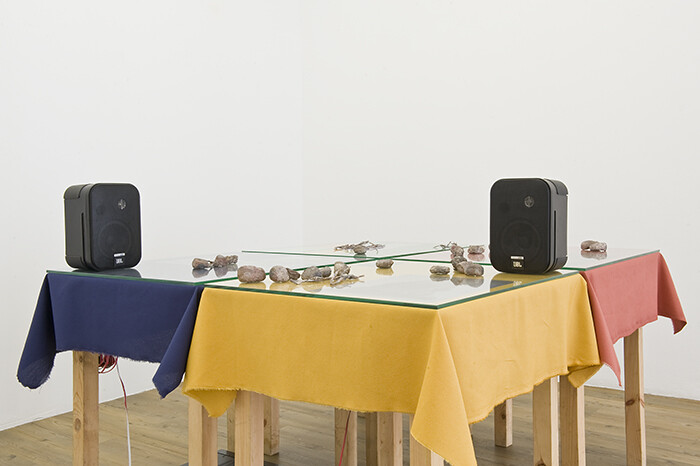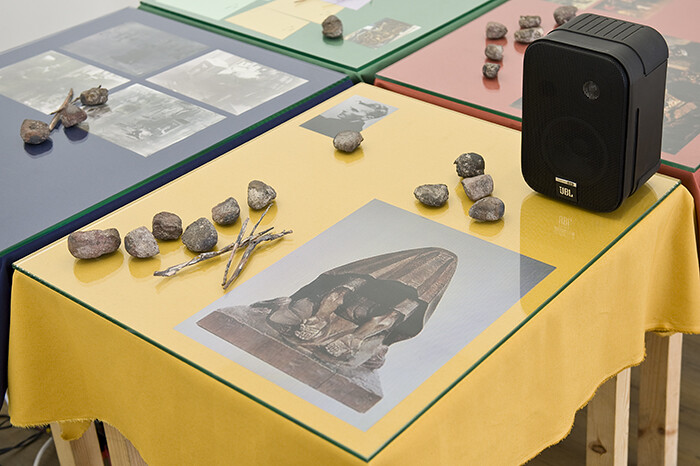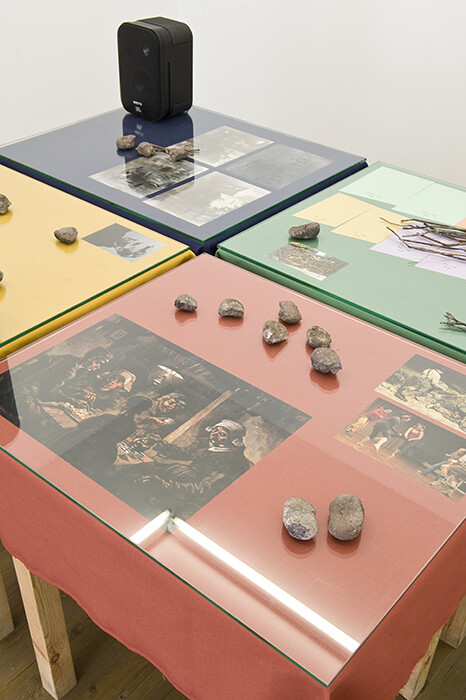Pursuing a clearly spiritual approach within a Christian cultural and ethical context, Andrea Büttner is one of the few contemporary artists who could plausibly cite St. Francis of Assisi, the twelfth-century Catholic friar who committed himself to a life of poverty, as a key influence. Her work Tische [Tables] (2013), which addresses notions of the “blessed poor” (those who disavow material possessions as a way of being closer to God) and the prehistory of farm-to-table dining, is a carefully constructed homily on what art can bring to the table on poverty, without ever lapsing into austerity chic. Büttner’s meager solo presentation at Barcelona’s NoguerasBlanchard forms part of a year-long exhibition series entitled “The Story Behind,” organized by in-house curator Direlia Lazo. In it, the artist exhibits four out of the original thirteen tabletop compositions she created for a dinner held at the Museum für Moderne Kunst Zollamt in Frankfurt last year. At Büttner’s invitation, five talks were given at dinner and recorded. Entitled Tischreden [Dinner speeches] (2013), the resulting extended audio recordings of the speeches and the ebb and flow of dinner conversation now serve as prime stimulants for the discursive appetites of the Barcelona gallery’s visitors.
Büttner’s four dining tables—and their blue, green, red, and yellow linens—are not simply performance relics or dining assemblages à la Hong Kong and Taipei-based artist Lee Kit or Swiss Nouveau Réalist Daniel Spoerri, but rather something between gambling baize (typically found covering poker tables) and altar cloths. These intensely precise, high-stakes surfaces allow for unusual symbolic investment. Accordingly, what at first could be mistaken for dun-colored gaming counters are actually zebra droppings and straw that were collected at the Frankfurt Zoo and cast in bronze. These metal objects (Tischschmuck [Table decorations], 2013) not only connect alchemy with fecal value—placed as they are atop a single table covered in the same colored paper that German banks use to wrap Euro coins—but they also have a perverse resemblance to earthy tubers and clusters of Paleolithic potato chips. Büttner assembles such materials in an elusive manner, giving them a just-on-the-tip-of-the-tongue quality, and she then juxtaposes the objects with images, which function like pictorial hyperlinks that are either readily apparent, or just one Google search away. These include reproductions of Realist and early modernist works, including Gustave Courbet’s The Stone Breakers (1850), Vincent van Gogh’s dismal The Potato Eaters (1885), and Ernst Barlach’s Veiled Beggar Woman (1919), as well as more recent pieces, like Sigmar Polke’s Cologne Beggars (1972), and what appears to be a photographic portrait of Austrian-British philosopher Ludwig Wittgenstein.
Although Büttner’s amalgamations undoubtedly have intuitive affinities with German art historian Aby Warburg’s Mnemosyne Atlas (1924–29), she does not necessarily generate new theoretical principles in terms of art’s consideration of poverty. Listening to the recordings of Büttner’s dinner becomes more like consuming thoughtful fiber while ruminating on its conceptually peristaltic menu. Documenta 13’s artistic director Carolyn Christov-Bakargiev deliberately offered no new insights in her talk on the figures she identifies as Arte Povera’s “dropouts,” yet their very rejection of novel production was precisely her point. In addition, speeches by scholar of German literature Liliane Weissberg, organizer of the artist-rights group Working Artists and the Greater Economy (W.A.G.E.) Lise Soskolne, and Chicago-based artist and writer Claire Pentecost similarly focused on duty, humility, and justice. The overall effect of her guests’ fibrous discussion addresses what might be described as our symbolic health and serves as a kind of relief from the intellectual constipation that the intersection of morality and contemporary art can induce.
Büttner’s interest in poverty stems from her recently completed doctoral research on art and shame at the Royal College of Art. And she herself chooses to avoid the limelight by withdrawing as a visible protagonist from her own work. By giving the floor to her dinner guests, Büttner subtly avoids what might otherwise have come across as a kind of evangelical relational aesthetics. Over the course of their speeches, we not only learn about tzedakah (the Jewish conception of charity without pity), but also some non-profit art institutions’ shameful failure to pay honorariums to their artists. In cultural theorist Franco “Bifo” Berardi’s talk (delivered by artist Adrian Williams)—in which we encounter his term “Un-growth,” which describes a form of politics without capitalist expectations—we are familiarized with a “frugal way of being happy with the richness that we have.” We also learn in the recording about Wall Street’s orchestration of the deregulated food futures markets that emerged in the 1990s and the expropriation of subsistence farmers from their ancestral lands.
Nevertheless, given the reality of Spain’s persistent unemployment, austerity measures, and corruption scandals, many of these well-intended words begged for local specificity. Given the monastic tone of Büttner’s work, polemical Benedictine nun and Catalan social activist Teresa Forcades, for example, would have made a fascinating, if improbable, contribution to a discussion especially tailored for the issues that concern contemporary Barcelona. Much like having to imagine Pentecost’s dinner menu—which included bone marrow, beetroot, and potatoes, among other dishes—instead of actually being able to savor it ourselves, we were left hungry for a more hearty presentation of Büttner’s project in a city with a starkly different economic context from that in which her work was first conceived.









